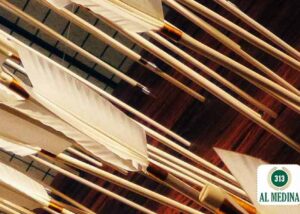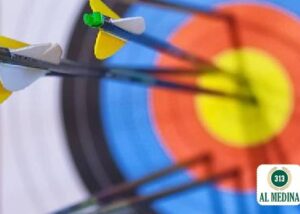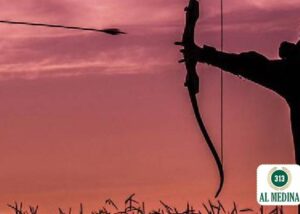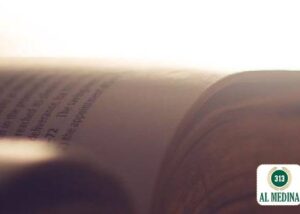Quran
Hadith
Islamic Text
There is a Hadith stating that the archery range is part of Jannah. However, this Hadith is weak. Therefore, the rules of narrating weak Hadith must be followed.
وَقَدْ وَرَدَ فِي التَّرْغِيبِ فِي الرَّمْيِ أَحَادِيثُ كَثِيرَةٌ غَيْرَ مَا ذَكَرَهُ الْمُصَنِّفُ – رَحِمَهُ اللَّهُ -. مِنْهَا مَا أَخْرَجَهُ صَاحِبُ مُسْنَدِ الْفِرْدَوْسِ مِنْ طَرِيقِ ابْنِ أَبِي الدُّنْيَا بِإِسْنَادِهِ عَنْ مَكْحُولٍ عَنْ أَبِي هُرَيْرَةَ رَفَعَهُ «تَعَلَّمُوا الرَّمْيَ فَإِنَّ مَا بَيْنَ الْهَدَفَيْنِ رَوْضَةٌ مِنْ رِيَاضِ الْجَنَّةِ» وَفِي إسْنَادِهِ ضَعْفٌ وَانْقِطَاعٌ. (نيل الأوطار)
Many Hadith regarding archery have been cited in al-Targhib, excluding what was mentioned by the author, may Allah (Glorified and Honored is He) have Mercy on him. Among which is that which the author of Musnad al-Firdous narrated from Ibn Abi Dunya, with his chain on the authority of Makhul, from Abi Hurairah from the Prophet ﷺ, ‘Learn archery for indeed what is between the two points is a garden from the gardens of Paradise.’ In his chain is weakness and rupture. (Imam al-Showkani, Nayl al-Owtaar).
حَدِيثُ: “مَا بَيْنَ الْهَدَفَيْنِ رَوْضَةٌ مِنْ رِيَاضِ الْجَنَّةِ”، لَمْ أَجِدْهُ هَكَذَا إلَّا عِنْدَ صَاحِبِ “مُسْنَدِ الْفِرْدَوْسِ” مِنْ جِهَةِ ابْنِ أَبِي الدُّنْيَا بِإِسْنَادِهِ عَنْ مَكْحُولٍ، عَنْ أَبِي هُرَيْرَةَ رَفَعَهُ: “تَعَلَّمُوا الرَّمْيَ؛ فَإِنَّ مَا بَيْنَ الْهَدَفَيْنِ رَوْضَةٌ مِنْ رِيَاضِ الْجَنَّةِ” ، وَإِسْنَادُهُ ضَعِيفٌ، مَعَ انْقِطَاعِهِ. (التلخيص الحبير)
As for the Hadith: ‘What is between the two points is a garden from the gardens of Paradise.’ I did not find it as such except with the author of al-Firdous. From the chain of Ibn Abi Dunya, with his chain on the authority of Makhul, from Abi Hurairah from the Prophet ﷺ, ‘Learn archery for indeed what is between the two points is a garden from the gardens of Paradise.’ And the chain is weak as well as being disconnected. (Imam Ibn Hajr al-Asqalani, Talkhees al-Haber).
As mentioned by Imam Ibn Hajr al-Asqalani and Imam al-Showkani this narration is weak. Therefore, one must consider the rules that apply to weak narrations. It is not acceptable to narrate a weak Hadith in the same manner as a Sahih Hadith. Rather one should clarify the weakness or at least allude to it.
وَمَنْ نُقِلَ عَنْهُ ذَلِكَ: ابْنُ حَنْبَلٍ، وَابْنُ مَهْدِيٍّ، وَابْنُ الْمُبَارَكِ، قَالُوا: إِذَا رُوِّينَا فِي الْحَلَالِ وَالْحَرَامِ شَدَّدْنَا، وَإِذَا رُوِّينَا فِي الْفَضَائِلِ وَنَحْوِهَا تَسَاهَلْنَا
تَنْبِيهٌ: لَمْ يَذْكُرِ ابْنُ الصَّلَاحِ وَالْمُصَنِّفُ هُنَا، وَفِي سَائِرِ كُتُبِهِ لِمَا ذُكِرَ سِوَى هَذَا الشَّرْطِ، وَهُوَ كَوْنُهُ فِي الْفَضَائِلِ وَنَحْوِهَا، وَذَكَرَ شَيْخُ الْإِسْلَامِ لَهُ ثَلَاثَةَ شُرُوطٍ
أَحَدُهَا: أَنْ يَكُونَ الضَّعْفُ غَيْرَ شَدِيدٍ، فَيَخْرُجُ مَنِ انْفَرَدَ مِنَ الْكَذَّابِينَ وَالْمُتَّهَمِينَ بِالْكَذِبِ، وَمَنْ فَحُشَ غَلَطُهُ، نَقَلَ الْعَلَائِيُّ الِاتِّفَاقَ عَلَيْهِ
الثَّانِي: أَنْ يَنْدَرِجَ تَحْتَ أَصْلٍ مَعْمُولٍ بِهِ
الثَّالِثُ: أَنْ لَا يُعْتَقَدَ عِنْدَ الْعَمَلِ بِهِ ثُبُوتُهُ، بَلْ يُعْتَقَدُ الِاحْتِيَاطُ
It has been narrated from Ibn Hanbal, Ibn Mahdi, Ibn Mubarak, who all said, if Hadith regarding Halal and Haram are narrated then we are strict. And if Hadith regarding the virtues of deeds and the like are narrated then we are lenient.
Important Note: Ibn Salaah and the author did not mention here or in any of their books, any conditions except for this one. Namely, it (the weak Hadith) being used for the virtues of deeds. Shaykh al-Islam mentioned three conditions for it:
Firstly, the weakness cannot be severe, this excludes narrations that have liars in them, or narrations of those accused of lying, and those who make grave errors when narrating, al-Alai narrated agreement upon this condition.
Secondly, it must be in line with an established acted upon teaching (of the Deen).
Thirdly, when acting upon it (the weak Hadith) one cannot believe it to be a sound narration, rather one must keep in mind caution.
Imam al-Sayuti, Tadreeb al-Rawi volume 1 page 351 Dar Taybah).
And Allah (Most High) Knows best.
-Answered by Shaykh Noorud-deen Rashid (08.07.2022)
-With special thanks to Sidi Yusuf Asghar for assisting with Nusoos translation
Hadith grading confirmed by Shaykh Mujeer al-Khateeb.
See also:
Using Weak Hadith






